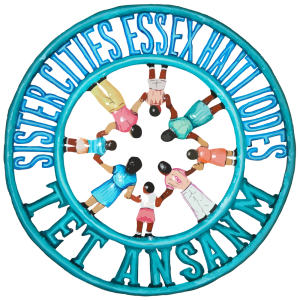Deschapelles Library Project
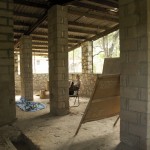
The Sister Cities Essex Haiti Board working collaboratively with ODES (Organization pour Development Economique et Social) identified a suitable first project for the SCEH initiative: the creation of a library/community center. The SCEH Board created a Library Committee to work with ODES to establish the library, including identifying the site for the library, locating suitable books in French and Kreyol, determining a source of electricity, advising with respect to furnishings and equipment, assisting ODES with respect to its operations, and raising necessary funds. ODES has taken responsibility for its operations, including hiring staff, enlisting volunteers, setting policies (including the hours of operation, book lending systems, use of the building by community members and groups), establishing rules and regulations, and setting a budget. A building, a former stone cattle barn located on the main road of Deschapelles, was proposed as a suitable location for the library. Other sites have been recently suggested in the Deschapelles area that may be more economical and more easily adaptable for a library. The SCEH Library Committee, in collaboration with ODES, will be assessing the most suitable site for the library.
The Deschapelles Library is Needed
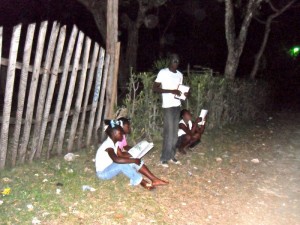
Despite the fact that all Haitians value education highly there are few libraries in rural Haiti. Indeed, although the official language in Haiti is Kreyol, until recently there were very few books written in Kreyol as French was and still is taught in elementary, secondary and University level schools. French is also the language used in formal governmental, business and international communications. There are very limited opportunities to borrow books or to purchase books (even if one had the funds). ODES would like to change this by providing a space with opportunities for learning.
The Deschapelles Library could be used as:
- A place for students to study after school particularly after dark. Since most households do not have electricity, children are routinely found studying their schoolwork in the evenings while sitting under the few street lamps found on the HAS campus or under rare isolated pools of light in the community.
- A lending library for children and adults. Even adults who learned to read have few opportunities to read for lack of books, and thus lose their facility for reading. Reading for rural Haitians is almost all education-oriented, and reading for pleasure is rare.
- A place for students and adults to conduct research on a variety of subjects of interest. Many Haitians view libraries as a place to research and learn about a variety of topics.
- A place for mothers and fathers to bring young children for exposure to books for pleasure and educational “toys”.
- A community gathering place, especially on subjects of interest such as educational, technical and environmental seminars.
- A potential site for a composting latrine and model gardening systems.
The Deschapelles Library is Achievable within a Short-Time Period
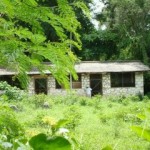
A former stone cattle barn (approx. 1,800 sf) just off the main road of Deschapelles has been proposed as a site for the library. A donor has provided a new metal roof, rafters, electrical wiring for the building, and screens for all windows. The remaining items that are needed to achieve a functional library are the following:
- new smooth cement floor as the existing one is rough and pitted
- some repair of the outer stone walls because the mortar has disintegrated
- lighting fixtures so students can study at night
- tables, chairs, benches so people will have a comfortable place to study and read
- librarian’s desk
- library materials such as membership cards and card catalogue
- shelving for the books
- books in French and, for young children, in Kreyol
- blackboards and slate boards, as paper is a luxury many cannot afford
- DVD/TV for educational videos
- power source (generator and/or solar) as there is no other available source of electricty
- landscaping for beauty and for model gardens
- possibly a composting latrine
Other sites have been recently suggested in the Deschapelles area. The SCEH Library Committee, in collaboration with ODES, will be assessing the most suitable site for the library. After the library/community center is operational, additional items could be provided such as computers, landscaping, walkways from the street, covered terrace.
The Deschapelles Library is Affordable
A preliminary estimate for the furnishing and completion of a workable library is approximately $25,000. SCEH held its first fundraising event, Have a Heart for Haiti, on October 22, 2010 on the grounds of the Connecticut River Museum. The fundraiser supported Hospital Albert Schweitzer and the SCEH Deschapelles Library Project. Over 250 people celebrated Haiti’s unique culture, music, art and food while raising funds for Hospital Albert Schweitzer and the Deschapelles library project. Thanks to all who made this very successful fundraiser a success!
The Deschapelles Library is Appealing
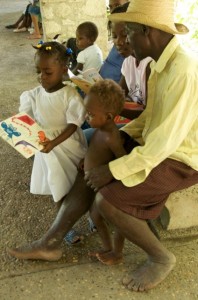
The community of Deschapelles is already enthusiastic about the prospect of having a library as a place to study and to have access to books. Just as the Essex Library is well used, well regarded, and broadly supported by the Essex community, so will be the Deschapelles library. The Essex Library can serve as a model for the Deschapelles library with areas not usually thought of in Haitian libraries, such as a children’s area, a lending library, study areas, a community center, and information resource center. The Deschapelles library will become, like the Essex Library, well used by many constituent groups such as children and their families, service organizations, businesses, schools, churches and technical informational meetings.
The Deschapelles Library Promotes a Sustainable Relationship between the People of Deschapelles and the People of Essex
The Deschapelles library project is one that is capable of involving a varied group of people. Much of the work can and should be done in and around Essex, such as fundraising, planning, book research and collection, and educational toy collection. Due to the limited availability of accommodations and resources in Deschapelles, it will not be possible for everyone who would like to visit Deschapelles to do so. It is possible, however, for people in Essex and Deschapelles to establish relationships with one another through communications and inter-town visits. These inter-town visits will enable the people in both Essex and Deschapelles to understand each other and develop mutual knowledge and respect.
The Deschapelles Library is Conducive to Educating Essex Residents about Haiti and its Unique Qualities, Needs and Opportunities for Collaboration
Simply describing the characteristics of and reasons for a library/community center in Deschapelles provides many opportunities to give Essex residents a better understanding of Haiti. A few examples:
- Most people do not have the luxury of having electricity, candles or kerosene for lamps. Consequently, children either have to study before the sun sets or after it rises or try to find a place to study in the isolated pools of light cast by the few street lamps. The proposed library would give students a lighted place to study after dark.
- Most Haitian homes are small and households may have only one table that is used by all family members for many activities. The proposed library would give students a quiet, safe place to study after school.
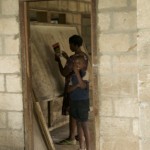
- Paper is scarce and expensive. The proposed library would have chalkboards and slates for children to practice their math and handwriting.
- Because there are few opportunities for many adults to read, they lose that skill once they leave school, in part, because they do not have access to books.
- Electricity is scarce because government electricity is expensive and unreliable. Private electricity generation is not available except through privately purchased fuel-operated generators which becomes expensive.
- Mosquito-borne diseases, such as malaria and dengue fever, are prevalent in the area so the proposed library would have screens.
- Ceiling fans are not planned for as part of the project as the building has good ventilation and fans would add to the cost of electrical generation.
- There is limited public education in Haiti and the two largest expenses for a family are food and school fees and supplies.
- A venue is needed for “internally displaced people” (IDPs-those who have left Port au Prince for the countryside) to rebuild their lives.
- A composting latrine at the library/community center could be used to introduce the concept to area residents for disposal of wastes and use of such wastes for fertilizer.
Ongoing Costs of Library/Community Center
Since the library/community center would be primarily staffed by ODES volunteers, the ongoing costs are anticipated to be:
- One librarian to administer the library and coordinate volunteers
- A caretake (groundskeeper)
- Replacement books
- Children’s toys—replacement
- Fuel for generator to provide electricity
- Supplies
- Computer equipment (possibly)
A schematic of the interior of the cattle barn that has been proposed as a possible site for the library is provided below:
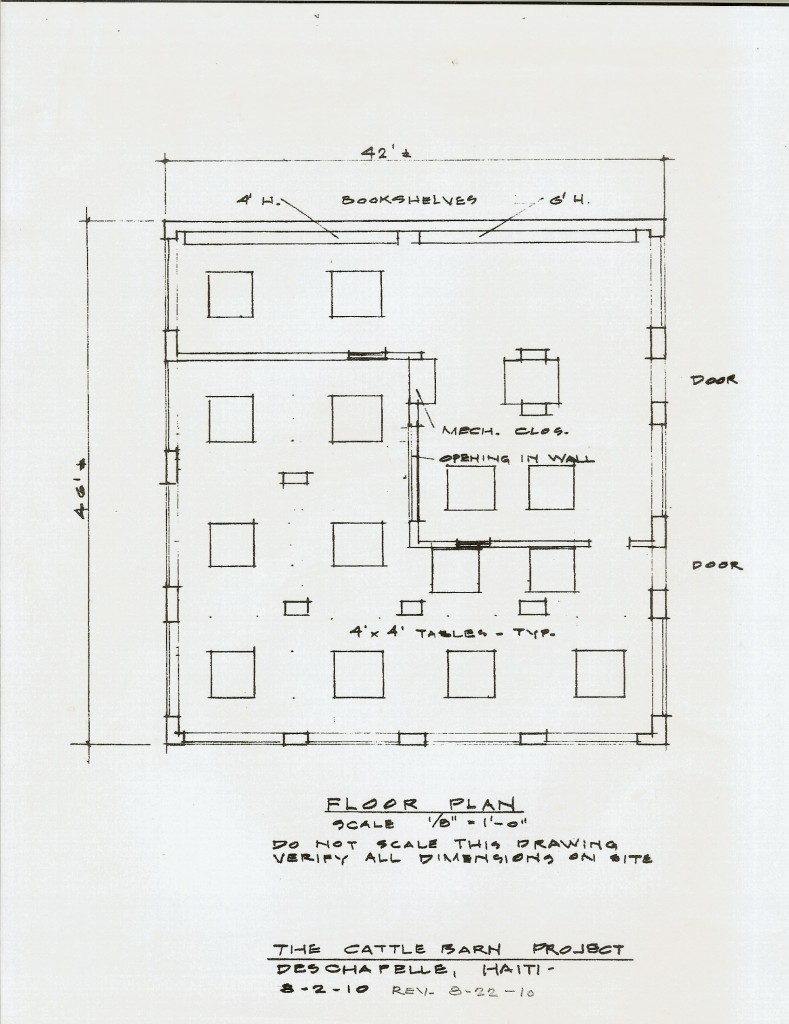
Additional sites that may be more economical and more easily adaptable for a library are being considered by ODES and the SCEH Library Committee.
